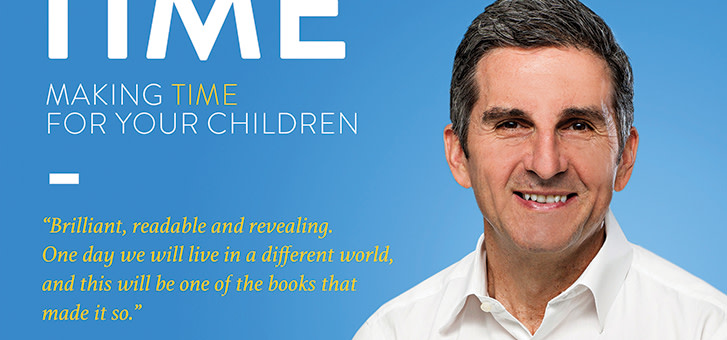Fathers should spend time with their children. It’s a sentiment that should be obvious, but Daniel Petre, a former senior manager at Microsoft who now plays with venture capital and philanthropy, says that this is not the case in the corporate world. In this new edition of Father Time: Making Time for Your Children, Petre urges corporate leaders to invest more in father-friendly workplaces. Unfortunately the book is rather poorly edited, blunting its argument somewhat, but one can only hope that this is because the author sent the proofreader home early in order to spend more time with their kids.
Petre portrays an ugly corporate culture overseen by “old white guys,” where executives work long hours, not, says Petre, because they need to, except to prove loyalty to the company, and where neglecting family time is a kind of badge of honour. But children need fathers, and fathers can’t console themselves with the idea of “quality time” so called spent with children at the very end of the day. Kids simply need quantity time. To this end, Petre argues for working smarter rather than longer, which is not only better for families, but makes for happier workers who in the end are more productive. He suggests that workers find companies with a culture that incorporates family-friendly ideas.

This is all fine advice, but this is a book that is primarily addressed to fathers who happen to already be corporate executives—a minority of the population, it is fair to say. And it is well and good for Petre and his fellow executive cohort who have the opportunity to make changes. The rest of us might be sympathetic with the overall sentiment, but may be more pessimistic about the openness of corporate culture to more father-friendly practices. After-all, global corporations such as the one Petre worked for, as he admits, are, and not surprisingly, interested in the wellbeing of their shareholders over the wellbeing of their workers. They are only interested in creating family-friendly workplaces if it does not impact their ability to create profits.
Despite Petre’s argument for balance, there remains a thread running through his book of a corporate mentality centred on “success”—for the company, the businessman, the father.
He contrasts two examples: “Barry,” who has focused on work his whole life and has missed his children’s growing up, and “John,” who started his own company and was a success at fatherhood and business without working long hours. The implication is clear. You can have both wealth and family life. But interestingly there is no third example of a father who spends time with his children but who has had to forego business success to accomplish that. This is akin to the way we address environmental issues in our culture—we want to be more environmentally friendly but only if we can have it at no cost to our lifestyle or wallet. But in this world, doing the right thing will always cost the individual, sometimes in serious ways. This is a key message of Jesus.
From a Christian point of view we might contrast success with love. Jesus was not a “success” by any corporate or even societal standard. True love involves sacrifice, our own wellbeing for the sake of others, beyond the interest of self or even our own family.
The argument of this book is mostly that being a good father is good for fathers and good for the company, rather than simply being the right thing to do, regardless.
And one would hope that our society can rediscover the fact that relationships trump economics every time, although this may be too radical a message for our blinkered corporate world.
Father Time: Making Time for Your Children, Daniel Petre, Ventura Press






